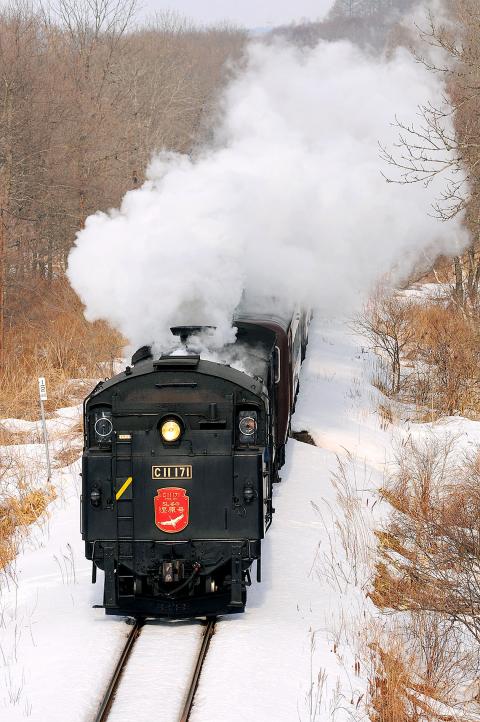Taiwan and Japan plan to launch a joint rail tourism campaign next month as part of expanding links between the two countries since a massive earthquake struck Japan in March last year.
In the campaign, dubbed “sister trains,” Taiwan’s CK124 steam engine and a similar Japanese train called the Hokkaido SL Fuyu-no-Shitsugen will be used to promote railway travel in both countries, authorities said.
The partnership idea came about during a visit to Taiwan by Japanese officials in April last year to promote tourism as part of Japan’s disaster recovery efforts.

Photo: CNA, courtesy of the Taiwan Railways Administration
After months of discussions and with the help of non-profit organizations, a promotional campaign was devised featuring a plan called “Train Travel: Winter in Hokkaido and summer in Taiwan.”
It is to be formalized on March 12 in a letter of intent signed by the Japan Hokkaido Railway Co (JR Hokkaido) and the Taiwan Railways Administration (TRA).
“It is the first time that Taiwan has entered into such a partnership with a foreign rail company,” said Wang Chuan-hsin (王川信), the TRA division chief in charge of the project.
JR Hokkaido said the promotional campaign is expected to help revive the economy in northeast Japan, an area that was hit hard by the powerful earthquake and ensuing tsunami on March 11 last year.
The partnership is also a means to express Japan’s gratitude for Taiwan’s tremendous humanitarian aid in the wake of the disaster, JR Hokkaido said.
For Taiwan, the project also offers an opportunity to enhance cultural preservation, according to the Society of Railway and National Planning, which has been involved in the partnership.
“We hope Taiwan can take this opportunity to learn from Japan’s ways of preserving invaluable cultural heritage like these locomotives,” said Jen Hen-yi, a spokesman for the society.
Although the full details of the promotional campaign have not been finalized, the TRA said, it plans to invite its Japanese counterpart to take part in Taiwan’s Railway Festival in June.
The CK124, built in 1936, is one of Taiwan’s most popular steam locomotives and is widely used by the TRA for promotional purposes.
In Japan, the C11-171 engine that pulls the SL Fuyu-no--Shitsugen Train was manufactured in 1940 and operated in various parts of Hokkaido.

SHIPS, TRAINS AND AUTOMOBILES: The ministry has announced changes to varied transportation industries taking effect soon, with a number of effects for passengers Beginning next month, the post office is canceling signature upon delivery and written inquiry services for international registered small packets in accordance with the new policy of the Universal Postal Union, the Ministry of Transportation and Communications said yesterday. The new policy does not apply to packets that are to be delivered to China, the ministry said. Senders of international registered small packets would receive a NT$10 rebate on postage if the packets are sent from Jan. 1 to March 31, it added. The ministry said that three other policies are also scheduled to take effect next month. International cruise ship operators

HORROR STORIES: One victim recounted not realizing they had been stabbed and seeing people bleeding, while another recalled breaking down in tears after fleeing A man on Friday died after he tried to fight the knife-wielding suspect who went on a stabbing spree near two of Taipei’s busiest metro stations, Taipei Mayor Chiang Wan-an (蔣萬安) said. The 57-year-old man, identified by his family name, Yu (余), encountered the suspect at Exit M7 of Taipei Main Station and immediately tried to stop him, but was fatally wounded and later died, Chiang said, calling the incident “heartbreaking.” Yu’s family would receive at least NT$5 million (US$158,584) in compensation through the Taipei Rapid Transit Corp’s (TRTC) insurance coverage, he said after convening an emergency security response meeting yesterday morning. National

PLANNED: The suspect visited the crime scene before the killings, seeking information on how to access the roof, and had extensively researched a 2014 stabbing incident The suspect in a stabbing attack that killed three people and injured 11 in Taipei on Friday had planned the assault and set fires at other locations earlier in the day, law enforcement officials said yesterday. National Police Agency (NPA) Director-General Chang Jung-hsin (張榮興) said the suspect, a 27-year-old man named Chang Wen (張文), began the attacks at 3:40pm, first setting off smoke bombs on a road, damaging cars and motorbikes. Earlier, Chang Wen set fire to a rental room where he was staying on Gongyuan Road in Zhongzheng District (中正), Chang Jung-hsin said. The suspect later threw smoke grenades near two exits

The Forestry and Nature Conservation Agency yesterday launched a gift box to market honey “certified by a Formosan black bear” in appreciation of a beekeeper’s amicable interaction with a honey-thieving bear. Beekeeper Chih Ming-chen (池明鎮) in January inspected his bee farm in Hualien County’s Jhuosi Township (卓溪) and found that more than 20 beehives had been destroyed and many hives were eaten, with bear droppings and paw prints near the destroyed hives, the agency said. Chih returned to the farm to move the remaining beehives away that evening when he encountered a Formosan black bear only 20m away, the agency said. The bear